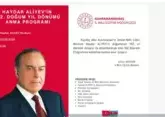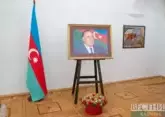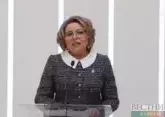Among the political mysteries of the post-Soviet era, darkened by the veil of high spheres of power, the relations between Vladimir Putin and Heydar Aliyev are not fully disclosed. Where did the so-called interpersonal ‘chemistry’ come from, and what was it? In fact, an understanding of why a long-term political rapprochement became possible, while a certain respectful distance between Moscow and Baku after the victory of Vladimir Putin in the 2000 presidential election remains, depends on the answer to this question.
Fable
For nearly twenty years we have been witnessing the various fruits of the ‘fine’ tuning of relations between Russia and Azerbaijan. The grounds for such a long mutual sympathy, unique to the post-Soviet space, in various modulations can be reduced to the following three factors: the ideological closeness of the elites - both countries incline to conservatism; mutual support of the ‘illiberal democracy’ model through the development of the joint investment-economic and other business projects; stake on preserving continuity - the close interaction of the special services against the background of the growing potential of the secular ‘color revolutions’ and unforeseen Islamist attacks from the militarized underground of the South and North Caucasus. It should be noted that the interaction formula works despite the barriers of the Karabakh crisis.
Based on these established rules or the unspoken model of the inter-elite communications norm of the highest level, many of the complexities of the current agenda of bilateral relations over the past 20 years (for example, associated with the access of Western companies to the development of the Caspian resources or the reasons for the radar installation in Gabala) were of a private nature and did not turn into a crisis of mutual trust. On the other hand, for example, Ilham Aliyev’s refusal to take part in the Eastern Partnership Riga Summit in 2015 became for Moscow a marker that the country preserves the developed model of compromises with Moscow, while on the Crimea issue, Baku naturally agrees with Kiev.
Leaders
The Russian and Azerbaijani bureaucracies have a common historical basis. This is all about the ruling class, which historically came to power in the 1960s and changed the first generation of the Bolsheviks (for Azerbaijan this is the line from Veli Akhundov to Heydar Aliyev). In the 1990s it won again in the face of tough new competition from the newly emerging post-Soviet capitalists and political idealists. It's about the generation of managers, which is often called the ‘Andropov’s call.’ These people from different spheres of government and authority, from different Soviet republics, nevertheless, were tuned to the same wavelength - their aim was a profound modernization and transformation of all spheres of life and economy of the Soviet Union in the mid-1980s. Heydar Aliyev was one of them, moreover, he was one of the leaders of that wave, and quite a lot was written about this. Vladimir Putin, to a certain extent, is following the ideas of Andropov’s modernization which never took place. Exactly on this foundation, the mutual understanding arose, the convergence of views between Heydar Aliyev and Putin, which is well known, became possible.
In addition to the professional fraternity, which binds all people who have given years to service in intelligence and security system, their relationship was complemented by Putin’s deep and undisguised respect for Heydar Aliyev as the leader of the late Soviet modernization of 1970-1980. And Heydar Aliyev, of course, knew this. One can only guess what ‘word of honour’ Heydar Aliyev could hear from Putin - maybe to protect young President Ilham Heydarovich against the dangers of coups (remember the events of the parliamentary elections of October 2005), or maybe just a promise not to obstruct the country’s course. Let’s not guess.
But surely something of this kind should have remained as Heydar Aliyev’s spoken testament to Putin as for Azerbaijan. Let's not forget how Putin keeps his word. Virtually all the figures that he inherited from Boris Yeltsin, all the most sensitive balance sheets of domestic politics and economy personally important for the Yeltsin family, were preserved intact by Putin as long as it was possible. It is clear that with regard to Heydar Aliyev’s last wish, Putin’s ability to keep his word could have been further emphasized, given the very mental connection between two technocrats described above. The main thing here is a commitment to conservatism. This intonation, which was not immediately found, gradually penetrated the semantic constructions of the ruling elite.
Let’s compare the speeches and articles of the former head of the presidential administration of Russia, Sergei Ivanov, and the publications of his colleague, the head of the presidential administration of Azerbaijan, Ramiz Mehdiyev. Both emphasize the importance of conservative values while betting on the secular nature of the state, both speak about the difficulty of maintaining sovereignty at different levels of the state and society in the context of the expansion of the global world. By the way, recall that Ramiz Mehdiyev maintains constant contact with the heads of the Russian Security Council both on a bilateral basis and as a participant of the Security Council Secretaries’ Summits of the CIS countries. This is another demonstration of the ideological proximity between the two countries’ elites platforms. In this sense, the leaders of the new revolutionary wave, cracking the established rules of communication and a delicate balance of interests, such as Prime Minister Nikol Pashinyan, are unlikely to be that close with Putin, even under the scenario of maintaining the stable relations between the two countries.
System
After 16 years, in fact, little has changed. Vladimir Putin and Ilham Aliyev, who took over the reins from his father, are still guidelines for the corporation of power in their countries. Of course, their effectiveness depends on the ability to resist the pathologies of bureaucratic systems - from corruption, to other self-inflicting trends. In the case of Azerbaijan and Russia, there is also the problem of external pressure from the Western liberal project, which does not need strong competitors. But there is another problem, which has been flourishing during the last decade - the ‘Burning South’ - the chaos of the Islamist reaction, caused, among other things, by the rampant western expansion. In order to survive in such conditions, the elite needs an effective moral mobilization, supported by society.
Of course, in response to the sanctions, as in the times of the Soviet-American confrontation of the Cold War, it is unwise to reduce the trade and economic relations with the Western world, to cut the channels for obtaining the experience of technical modernization. This is the absolute value of the Western project, as Yury Andropov once said. Though now we have a better understanding of what kind of West we are dealing with. We see a ‘Sunset Europe’, which further goes along the route of moral relativism into an unknown and dangerous space of maximizing personal and political freedoms to the detriment of traditional, essentially conservative values, to the detriment of the interests of the family and the state. This moral relativism affects the post-Soviet space, including the business and political elites.
Against this background, the apparent strengthening of Azerbaijan’s solidarity with Russia is taking place at the orbit center of the ‘Alternative West’ project, understood as the result of a synthesis of universal principles of social and technical modernization with the values of morality, family, and respect of the state as a way of a clearer, if you like, vertical social organization .
As this new project expands, the position of the Euro-Atlantic world will become increasingly tougher, both in relation to our countries and to other states that find themselves not only on the political and economical but also on the ideological boundary of the two Great Europe-Eurasia integration projects.
Formally, Azerbaijan as a member of the Non-Aligned Movement adheres to the views of this community. In practice, Baku professes a dynamic multi-vector approach, benefiting from the advantages of one direction or another, when it is required, and trying not to enter into the sharp conflicts with the powers. This is one of the aspects of Heydar Aliyev’s foreign policy heritage.
Without joining the EEU, Azerbaijan has become the closest ally of the integration association. After Russia, Baku, in fact, is the main partner for Astana and Minsk from among the post-Soviet states. At first glance, the existing disposition with Russia on the issue of the oil and gas exports ‘to the same markets’ after a more detailed analysis appears as an element of the bigger interaction picture of oil and gas companies - Azerbaijani SOCAR with Gazprom, Rosneft, Lukoil - who find common language in the beneficial joint projects. Such purposes consent can be observed on many other topics. Another thing is that it is not always manifested or publicly advertised.
Of course, the scales of Russia and Azerbaijan, to put it mildly, are incomparable. There is a significant difference in the international agenda, there are differences in sectoral and corporate interests, there are some frictions in connection with the Karabakh settlement. But the balance found between the differences in the views of Moscow and Baku and their coincidences depicts a curious mosaic of a common vector. We, living in Russia and Azerbaijan, are really lucky that our contemporaries - Heydar Aliyev and Vladimir Putin - made it come true.










